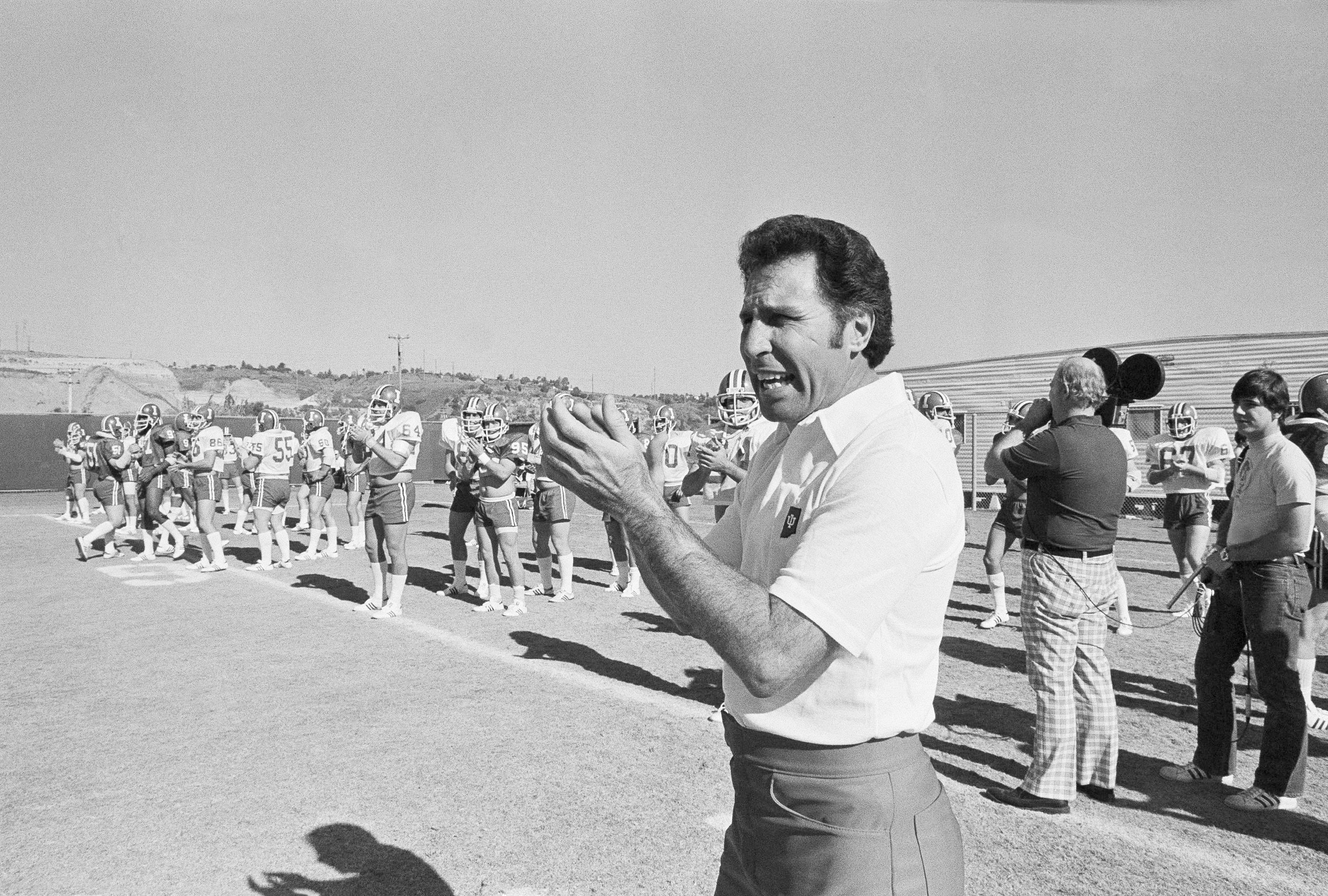

‘It was a very special team’: IU in the 1979 Holiday Bowl
That team was built by the dogged recruiting of Lee Corso, and led by a group of experienced players who had grown up together in the rough-and-tumble Big Ten.
Dawn Mitchell, dawn.mitchell@indystar.com
- Lee Corso, a former Florida State University football star and longtime ESPN “College GameDay” analyst, is retiring after 38 years on the show.
- Corso’s career at FSU spanned athletics, academics, and coaching, leaving a lasting legacy on the university.
- Known for his versatility and nicknamed “Sunshine Scooter,” Corso excelled in football, baseball, and briefly basketball at FSU.
- Corso’s impact extended beyond the field, influencing generations of players and fans with his enthusiasm and motivational skills.
Lee Corso’s impact at Florida State still resonates today, nearly 72 years after he arrived in Tallahassee as a great athlete and coveted recruit from Miami.
From his hometown playgrounds, where Corso dazzled as a youth in multiple sports, including fastpitch softball as a pitcher, to college football fields as the Seminoles’ “Sunshine Scooter” and later as a head coach at Louisville and Indiana, to his role as the immensely popular, iconic ESPN football analyst on “College GameDay,” Corso’s persona has seemingly never changed.
“I don’t think he can be anything but a nice guy,” said Gene McCormick, 90, who competed with Corso on those Miami playgrounds and was later reunited with him at FSU in the mid-1950s.
“Corso was a guy you would like to have on your side. … he’d always shake your hand.”
Congratulatory handshakes will certainly be shared as Corso is signing off from ESPN’s “College GameDay” and ending a 38-year career with the show that began in 1987.
Famous for his headgear picks and memorable catchphrase “Not so fast, my friend!” while holding his signature Dixon Ticonderoga No. 2 pencil, Corso will make his final appearance in Week 1 of the 2025 season in Columbus, Ohio, where hometown Ohio State plays Texas.
Corso and “College GameDay” haven’t been to Tallahassee for an FSU home game since a two-game swing in 2014, but Corso’s name generates smiles and fond memories that connect decades and eras at FSU.
“He’s the consummate Seminole to multiple generations,” FSU associate athletics director Rob Wilson said.
Lee Corso part of ‘early momentous times in FSU sports history’
FSU football was still in its infancy when Tom Nugent was named head coach in 1953 and coaxed the talented, versatile and speedy Corso to Tallahassee.
Corso starred in football, basketball and baseball at Miami Jackson High, earning All-City honors in all three and was named All-State in football and baseball. The 17-year-old was considered a prized recruit and, as folklore has it, agreed to play for Nugent with a promise that he would be the starting quarterback in FSU’s opener and first game ever against Miami that season.
Nugent kept his promise, and Corso fulfilled his over an illustrious four-year career (1953-56).
“Lee Corso was a part of one of the early momentous times in FSU sports history,” said Pat Hogan, 92, who became FSU’s sports information director as a student in 1952 and ended his career 38 years later as the university’s vice president.
“Corso, Burt Reynolds and Dick Howser were sort of FSU’s own ‘Rat Pack,’ ” Hogan said of the 1950s athletic trio that would become familiar names around the country — Corso on ESPN, Reynolds in acting and Howser in baseball — and future FSU Hall of Famers.
“I truly believe that Corso derived some of the theatrical flair that has served him so well from coach Tom Nugent here in Tallahassee,” Hogan continued. “The men and women of that era surely set Florida State on a path to greatness.”
The first steps on FSU football’s path in the modern era started in 1947, seven years prior to Corso’s arrival, when FSU made its debut after the university became coeducational again following World War II.
Historic highlights that winless five-game season were the first home game at Centennial Field against Stetson and the student body’s vote for the Seminoles nickname over 100 other options that included the Crackers, Statesmen and Fighting Warriors.
Don Veller quickly transitioned FSU into a small, Southern football powerhouse when hired in 1948. In his five seasons, the Seminoles won 24 of their first 26 games, dominated the Dixie Conference and went 31-12-1. Veller was responsible for FSU’s first football victory, its first winning season and one of three undefeated seasons (1950, 1999, 2013) in program history.
However, it was Nugent, known for his innovation and flair, who lifted FSU from its small college schedule to one that included big boys Georgia, Miami, Florida, Georgia Tech, Auburn and Tennessee.
His teams played Florida for the first time in history in 1958, and also registered the program’s first victories over Miami and an SEC team (Tennessee) that same year.
Lee Corso’s versatility a key to FSU’s football success
Corso’s career reflected those historic benchmarks set by Nugent as he left a record for versatility. The 5-foot-10, 165-pounder starred on offense, defense and special teams, earning the nickname “Sunshine Scooter” for his speed.
“Lee was a jack-of-all-trades, he could do it all, from quarterback to defensive back,” former FSU halfback (1957-59) and Tallahassee resident Bob Carnes said.
Corso led the Seminoles with six interceptions in 1954, 431 rushing yards in 1955, and 369 passing yards in 1956. He averaged 21.5 yards on kickoff returns and 12.1 on punt returns with a touchdown of 59 yards in 41 career games. For good measure, he was 5-for-5 kicking extra points.
Corso was honorable mention All-America (Associated Press) as a senior in 1956 and was selected to play in the Blue-Gray All-Star game, where he started at quarterback for the South. He tallied 2,650 career all-purpose yards and his 14 career interceptions was a school record for 24 years. Only Monk Bonasorte (15) and Terrell Buckley (21) finished with more picks.
Corso helped FSU win 24 games and earn the program’s second bowl invitation ever during his 8-4 sophomore season in 1954. Even though Corso reinjured his ankle on defense and was carried off the field in the 40-27 Sun Bowl defeat to Texas Western in El Paso, Texas, he went dancing at a Mexican Cantina across the border following the game, according to stories.
Corso’s moves were on display across campus, too.
Corso played outfield on FSU’s baseball team, finishing with a career .293 batting average in 65 games, 59 starts. He was recognized his senior season as an All-Florida Intercollegiate Conference selection.
Corso was listed on the FSU basketball team roster as a junior in 1955-56. But he appeared in just one early December game, against Boston University in the Carousal Classic in Charlotte, North Carolina, and did not score.
Corso was also inducted into Omicron Delta Kappa, a national leadership honor society for faculty and students, in the spring of his senior year in 1957.
Extracurricular activities were on the agenda as well.
One story Hogan recalled that involved Corso and teammates was when they killed a large wild pig hunting in woods south of Tallahassee. Obviously thinking it was a good idea, they carted it back to their dormitory basement on Tennessee Street. The group named the pig Polka Dotty, butchered and cooked it for pork that lasted nearly a month.
“Corso had taken what was described as a red bandana and tied it across his face when they butchered the pig because he couldn’t stand it, the smell was gosh awful,” Hogan said.
The late Jim Joanos, a Tallahassee lawyer and judge who was a FSU athletics “super fan” and FSU Hall of Famer, attended FSU from 1952-56 with Corso and covered sports for the school newspaper, the Florida Flambeau.
His memory of Corso reflected the sweet smell of confidence and success.
“I remember Corso as being quite flamboyant even then,” Joanos recalled in a story he authored in 2001 for Seminole Boosters, Inc. “He made quite a splash on campus. He has not changed. As far as I can tell from watching ‘Gameday’ on television he is still pretty much the same Lee Corso that was at FSU in the 50’s.”
Added Ron Schomburger, 93, who arrived at FSU in 1954 as a three-sport star from Pittsburgh and Army vet and was inducted into FSU’s Athletics Hall of Fame in 1994. “Just a great guy,” he said. “He’d make fun of players and they’d make fun of him, and he’d welcome it.
“Lee did everything with a smile.”
Lee Corso, ‘Nugent Boys’ key components to FSU football history
Nugent’s players, including Corso, roommate Reynolds and quarterback Vic Prinzi, were a close-knit group that was affectionally called “Nugent’s Boys.”
Many remained in regular contact over the years. However, Father Time has dwindled the ranks from more than 100 to less than 10 members for annual reunions at Carnes’ Tallahassee home or farmhouse during FSU’s football season.
Corso made the early reunions before his job at ESPN lifted him into television stardom.
The “Nugent Boys” watched from afar but weren’t surprised by Corso’s success and popularity. They are proud of their teammate, coach and friend.
“We are living in different worlds — but all of us, we are not only football brothers, we are university brothers,” said McCormick, who resides in Tampa.
Sue Hall, the longtime administrative assistant for legendary FSU football coach Bobby Bowden, has helped Carnes plan the “Nugent Boys” reunions. She said Corso routinely asked her to keep his name on the reunion list and gave her permission to share his private number when necessary.
“We are all old,” Carnes said and laughed.
“Corso kept saying he was coming – he wouldn’t retire.”
Leo Corso transitioned into coaching for 28 years prior to joining ESPN
Corso at FSU earned both a bachelor’s degree in physical education in 1957 and a master’s degree in administration and supervision in 1958. It’s also where he started his coaching career that spanned 28 years prior to joining ESPN.
As an assistant coach at FSU for two years (1957-58) under Nugent, Corso made an everlasting impact on incoming players such as quarterback McCormick, running back Carnes and offensive tackle Bob Swoszowski.
Freshmen had their last names printed in black magic marker on white masking tape stripped across their helmets. Corso couldn’t pronounce Swoszowski, so his on-the-spot nickname for the lineman has stuck to this day: “Swaz.”
“I thought Lee was one of the greatest motivators I ever saw in my life,” said Swoszowski, 85, who resides in Gainesville, Georgia, owns multiple McDonald’s restaurants in Northeast Georgia, and is proud his granddaughter also adopted his nickname.
“Lee cared about his players like nobody’s business. He was always excited and enthusiastic, talked real fast, and taught us to believe in ourselves. Lee showed us a kind affection and confidence that made us play better than we ever thought we could.”
Swoszowski said Corso and and staff also reminded the team to give an extra 10 percent during the end of every drill, a lesson he said players “carried with us the rest of our lives.”
Carnes said Corso preached it was “a cardinal sin” to let a receiver get behind you.
And McCormick, who religiously studied game tapes to gain an edge over opponents, said Corso was instrumental in helping the Seminoles stun Tennessee in Knoxville, 10-0, in 1958.
McCormick believes it was Corso’s suggestion to Nugent to have McCormick play the role of former Tennessee great running back Johnny Majors, a runner-up for the Heisman Trophy as a senior in 1956, against the Seminoles varsity in practice.
The game was also expected to feature the touted duel between fellow Majors brothers, Vols tailback Bill and FSU quarterback Joe. However, Bill was injured early in the game and did not return.
“I drove the varsity nuts in practice,” McCormick said.
“We were ready and prepared. By the middle of the first quarter, (UT) fans knew it was going to be a long day.”
Lee Corso’s affection for FSU could be seen on ESPN, too
Wilson, in his 38th year with the FSU athletics staff, and Corso have grown close over the years talking weekly during the college football season.
While Corso often asked Wilson about the Seminoles, his decision to stay at arm’s length from FSU’s campus during the fall was intentional.
Rival fans at times would goad Corso to tone down his FSU hype on ESPN’s “GameDay.” The show aired from Tallahassee 10 times, punctuated by FSU home wins over Clemson and Notre Dame, 28 days apart in its last visits in 2014. Corso picked the Seminoles in both games, and FSU is 15-13 all-time in games involving a Corso headgear selection.
“He showed his love of FSU on the air, but thought it would be unprofessional to do too much in terms of in-person visits that weren’t related to the show,” Wilson said. “It was always funny to me that when we’d talk about FSU and he didn’t necessarily agree with what I said, he would actually use the line ‘not so fast, my friend’ in every day conversation.”
Corso’s affection for FSU runs deep.
Twelve members of Corso’s family, including children and grandchildren, attended FSU. Corso was inducted into the FSU Athletics Hall of Fame in 1978. He received the Alumni Association’s Gold Medal in 2006, the university’s highest alumni honor.
An excited Wilson was on FSU’s sidelines when Jameis Winston’s 2-yard touchdown pass to Kelvin Benjamin lifted FSU in front of Auburn 34-31 with 13 seconds left in the 2013 BCS title game in Pasadena, California.
Wilson felt a sudden tug on the back of his sports jacket.
It was Corso, who said, “Settle down Robbie, it’s not over yet.”
But it was as FSU notched its third, and last, national title.
Wilson also witnessed Corso’s star power dating back to his youth in Miami.
The late actor Paul Gleason appeared in more than 60 films, including “Trading Places” and “Die Hard,” and 70 television shows. He also played football at FSU in the late 1950s and grew up in Miami. When Gleason made a rare return trip Tallahassee for a football game, he asked one favor of Wilson:
To meet Lee Corso.
“He asked if I knew Lee well enough to introduce them as ‘GameDay’ was here for the show,” Wilson said. “He didn’t want to meet Lee because of ESPN, but because he was his idol as an athlete growing up. It was cool to see two celebrities hit it off.”
Corso’s association with ESPN and FSU will be forever intertwined.
He is signing off as the longest-serving member of “College GameDay.” But before he became a household name in television, he helped prime FSU’s move to national prominence.
Corso is still considered one of the Seminoles’ finest athletes and ambassadors, seven decades after first stepping on campus.
“Corso and those Nugent Boys absolutely were a forerunner to all that Florida State has become,” Hogan said. “We are so fortunate that Lee kept those memories and those stories in front of mind with his national platform through all these years.
“His popularity and stardom has been a gift to FSU.”
Here’s how you can order the Lee Corso book
“Not So Fast, My Friend” will be published right after Corso’s final broadcast Aug. 30 on ESPN’s “College GameDay.” The coffee-table book retails for $44.95 but you receive a 25% discount if you order now. (We’ll do the math: That’s $33.71, plus shipping and taxes.) Order now at Corso.PictorialBook.com.
Jim Henry is Tallahassee Democrat sports editor. Email him at jjhenry@tallahassee.com.












